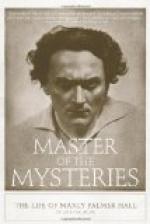He was a man of profound research, rather than the commercial chemist, and it was from him that Locke, in earlier days, had learned many lessons so well that now his career was watched with interest by many distinguished men of science.
Hadwell was delighted at the chance to examine the strange scrapings of wax which Locke had dug out of the sockets of the candlestick, the more so as they must contain some mysterious poison. First he studied them under a powerful lens, then by chemical reactions, until he made visible some peculiar crystals. Locke himself was amazed as his friend worked.
“You don’t know it all—yet—my boy,” smiled the aged professor. “There’s still something the old teacher can add to your education, and I’m glad, Quentin, very glad, for it will draw you closer to me again. I need you to carry on my work when I must lay it down. I’m not positive,” he continued, “but I believe these crystals to be those of Dhatura stramonium, and, as you say speed’s the thing, we’ll begin by noting the effect of the stuff as a gas on that guinea-pig over there.”
“Have you masks?” asked Locke, with true scientific caution.
“Yes—on the shelf. You’re keen, Quentin. These fumes can penetrate the tiniest aperture and, if my guess is right, without a mask, you would quickly laugh yourself to death.”
“Don’t, Professor, don’t joke, for there is no joy in that mad laughter. It is horrible, maddening, even to the hearer. Let us get to work. The father of the girl I love may even now be sinking to his death. We must determine the nature of this deadly stuff, and then find an antidote.”
The chemist brought out the cage in which the guinea-pig was placidly munching a lettuce leaf, and placed it in a convenient spot on the table. Then, after Locke, as well as the professor, had carefully adjusted the masks, the latter lighted a Bunsen burner and applied the flame to the deadly crystals. A pungent fume was given off and collected in a rubber bag, or cone, from which a long tube protruded.
This tube the chemist introduced into the cage. For a moment there was no perceptible change in the animal’s actions. Then it stopped eating, sniffed at the strange odor, and commenced to twitch violently. This twitching continued for several minutes, when the creature started to revolve in circles, like a Japanese dancing-mouse. Finally it became subject to spasms, and, although the professor withdrew the tube, these symptoms continued.
“I was right!” he cried. “It is an especially poisonous variety of that almost unknown Oriental drug, Dhatura stramonium. I think I can find an antidote to it, also. To work, my boy, to work!”
One experiment after another resulted in failure, however, and it was while they were so engaged that the telephone bell rang and a feminine voice inquired for Locke.
It was an excited Eva who called. “Quentin,” she burst forth, breathlessly, “what do you think has happened? The strangest thing! Flint has escaped. Tell me what to do. Can’t you come to me at once? I need you.”




